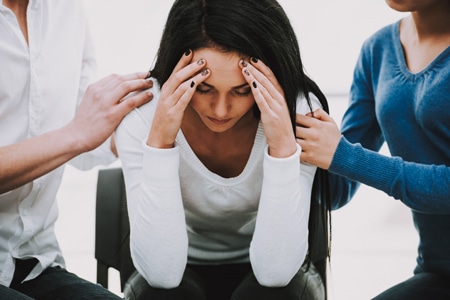Does drinking affect your period? Yes, it absolutely can.
Alcohol can cause reduced inhibitions and a hangover that will leave the person regretting the decision to drink. It can have a massive impact on a woman’s body and mind, including her menstrual cycle. If you’ve noticed that your period stopped after you consumed and misused alcohol, you are not alone. In this blog, we’ll answer common questions like, “How does alcohol affect your period?”

What Is a Menstrual Cycle (Period)?
Menstruation is considered the monthly shedding lining of a woman’s uterus, which individuals know as “the womb”. When a woman has a normal period, the lining of their uterus sheds preparing the woman for a possible pregnancy. The menstrual blood flows from the uterus through her cervix and out of the body through her vagina.
A menstruation cycle or period is also referred to as a menstrual cycle. It is the sequence of events that occur within a female’s body as she prepares for a possible pregnancy. The menstrual cycle begins on the first day of the female’s period, which lasts anywhere between 4 to 7 days. Overall, the time between periods of menstrual bleeding or cycles can range from 28 to 35 days.
How Does a Menstrual Cycle Work?
The fluctuation of the hormones triggers the steps in a woman’s menstrual cycle. There is a gland in the brain called the pituitary gland and the ovaries in the woman’s reproductive tract. It works together to release specific hormones at a particular time during the period.
Furthermore, the first phase of a menstrual cycle is the menses phase. During this time, the woman’s uterus will shed. Typically, the woman will bleed for 2 to 7 days.
time, the woman’s uterus will shed. Typically, the woman will bleed for 2 to 7 days.
The next phase is the follicular phase, and it commonly lasts for 6 to 14 days. During this phase, the level of the hormone estrogen rises. It causes the lining of the uterus to grow and thicken again.
Another hormone called the follicle-stimulating hormone is also released during this phase. This causes follicles in a female’s ovaries to grow to be able to form a fully mature egg. Afterward, ovulation occurs, forcefully on day 14 in the 28-day menstrual cycle.
During the above phase, the luteinizing hormone causes the female’s ovaries to release the eggs. Otherwise, this is known as ovulation. Finally, the last phase of a female’s period is the luteal phase, which is when the egg is released from the ovary and travels through the fallopian tubes to the uterus.
Overall, the level of the hormone progesterone rises and prepares the lining for pregnancy. If the egg is fertilized by the sperm, it attaches itself to the lining of the uterus, forming pregnancy. And if not, then the levels of progesterone and estrogen drop. In the end, the linking of the uterus once again sheds during the menstrual period.
Alcohol Affects Women Differently
It is common knowledge that a female’s blood alcohol level will always be higher than a man’s, even if they have consumed the same amount of alcohol. This process occurs because women tend to have a smaller build than men, and a higher proportion of body fat. Furthermore, this fact, however, hasn’t always been known. Before the 1990s, various alcohol research knowingly excluded women due to the unpredictability of their menstrual cycle.
In the book, Woman of Substances, the author Jenny Valentish, discovered a connection between a woman’s menstrual cycles and alcohol habits. This research can act as a segue to helping more women get the help they need for their alcohol use. During her research, the author discovered that hormones affect the way a woman’s body craves and absorbs alcohol.
Furthermore, research has suggested that when females experience PMS, they may discover themselves drinking more alcohol during this period. Essentially, the woman is attempting to cope with their mood swings, irritability, and more by drinking.
Does Alcohol Affect Your Period?
Alcohol can affect a woman’s menstrual cycle (period). Irregular or stopped menstrual bleeding after alcohol consumption is a common concern for several women. The question transforms from, “Does alcohol affect your period” to “How does alcohol affect your period?”
As with any typical health-related issue, it’s advised to monitor alcohol intake in a general sense. However, the excess amount and binge drinking truly pose a significant problem. According to the National Institute of Alcohol Abuse and Alcoholism, engaging in regular alcohol use can cause skipped or irregular periods.
The process occurs because alcohol can temporarily increase testosterone and estrogen levels, wreaking havoc on the typical hormonal fluctuations during ovulation. If you’re a woman that desires to conceive, it’s vital to know that excessive and regular alcohol intake can affect ovulation, and hence fertility. It’s ideal to reduce all alcohol intake when on your menstrual cycle, to encourage healthy ovulation.
How Does Alcohol Affect Your Period?
Alcohol affects a female’s period in various ways. It can cause irregular menstrual cycles or stop the period due to an increased level of hormones such as testosterone and estrogen. Sometimes the luteinizing hormone can cause the first reason: hormonal imbalance.
Once a hormonal imbalance occurs, it can affect if the female’s period happens, how long it lasts, and how heavy the cycle will be. Engaging in alcohol use can also increase a woman’s androgen levels during the follicular phase. Then estrogen is in the ovulation phase.
Overall, this effect is most apparent in women who have engaged in binge drinking. When a woman drinks alcohol during their period, the following common menstrual symptoms can be worsened:
- Trouble sleeping
- Moodiness
- Bloating
- Cramps
Not only does engaging in alcohol use while on your period affect the menstrual cycle by causing bloating, but it can also worsen cramps. This is through impacting the balance of prostaglandins. Prostaglandins are a group of lipids created at sites of infection to assist in healing illness or injuries and tissue damage.
These lipids control processes such as blood flow, inflammation, and formation of blood clots, and they can even assist in inducing labor. During a woman’s menstrual cycle, prostaglandins trigger contractions in the female’s uterine muscle. The higher levels of prostaglandins can cause more extreme menstrual cramps.
Alcohol increases prostaglandin levels, worsening period cramps. Even though some women believe that alcohol is known to reduce physical pain, it can lessen the intensity of cramps. Once realized that alcohol is a diuretic, therefore causing dehydration, that theory falls off.
Alcohol is well known for dehydrating individuals, especially when it’s the only thing a person had to drink or it’s heavily consumed. As a result of drinking heavily, a woman’s period cramps can be worsened by the thickening of menstrual blood and fluids. Therefore, making it more challenging to pass through the uterus, cervix, and out of the body.
Alcohol can also make a female’s period heavier or cause them to bleed more during their menstrual cycle. Since alcohol is a blood thinner, it increases estrogen levels. Therefore, leading to a heavier period.
This process occurs because estrogen stimulates the overall growth of endometrial tissue or even the lining of the uterus that is being shed. Furthermore, a woman will have to shed during their period, meaning heavier bleeding.
How Does Alcohol Affect Hormones in Women?
Alcohol doesn’t just affect your period, it affects your overall hormone levels. In addition to exploring the question, “How does alcohol affect your period?” let’s also examine the effect of alcohol on several key female hormones:
- Estrogen: Excessive alcohol intake can lead to an increase in estrogen levels, which may contribute to hormonal imbalances and reproductive issues. On the other hand, heavy alcohol use may also suppress estrogen production in the long term.
- Progesterone: Chronic alcohol consumption may lead to decreased progesterone levels, which can disrupt the menstrual cycle and fertility.
- Cortisol: Alcohol consumption can temporarily increase cortisol levels, especially during periods of acute intoxication. Cortisol is a stress hormone, and its fluctuations due to alcohol can contribute to mood swings, anxiety, and other stress-related symptoms.
- Thyroid Hormones: Excessive alcohol intake can interfere with thyroid hormone production and regulation. This can lead to thyroid dysfunction, which may manifest as symptoms such as fatigue, weight changes, and menstrual irregularities.
- Prolactin: While acute alcohol intake may temporarily suppress prolactin release, chronic alcohol abuse can lead to elevated prolactin levels, which may contribute to reproductive and menstrual issues.
- Insulin: Alcohol can affect insulin sensitivity and glucose metabolism. Chronic alcohol consumption may lead to insulin resistance, which can increase the risk of developing conditions such as Type 2 diabetes and metabolic syndrome.
What Can I Drink During My Menstrual Cycle?
There are several other options to drink while a woman is on her menstrual cycle. It is ideal to avoid alcohol while on your period due to the reasons mentioned. If a woman notices irregularities while on her period due to her drinking habits, it’s ideal to stop drinking and schedule a gynecologist appointment.
If you would like a drink on your cycle, avoid fruity cocktails since they are high in sugar.
Whenever more sugar is consumed during a woman’s period, it can create a spike in her blood sugar and therefore worsen the effects. If you would like to drink socially, it’s okay to try non-alcoholic mocktails that aren’t made up of sugar, tea, or sparkling water. Coffee has been known to also worsen PMS anxiety and symptoms, so it’s best to avoid it if you can.

The Takeaway of the Connection Between Alcohol and Periods
It’s essential to keep in mind that alcohol’s effect on the period depends on how much a woman drinks and how often. Even though one alcoholic beverage every once in a while won’t affect your period (unless you have a specific condition), heavy drinking will. If you consider yourself a social drinker, the line between casual drinking and binging can get blurry fast if you’re not careful.
Women who are unable to control their drinking or are addicted to alcohol increase the risk of irregular or stopped periods. Additionally, “Does alcohol affect your period” yes, but it can also heavily impact a woman’s liver and increase her risk of diabetes or heart disease. Heavy drinking can impact a woman’s body in more ways than one. The impact alcohol can leave on a woman’s life stretches as far as affecting immunity, fertility, and heart health.

The Severity of Alcohol’s Impact
Alcohol-related issues, which result from drinking too much, too often, or too fast,are among the most remarkable public health issues in the United States. Many individuals have struggled with controlling their drinking habits in some part of their lives. Over 14 million adults aged 18 and older have alcohol use disorder (AUD), and 1 in 10 children live in a home with a parent who has a drinking problem.
The good news is that no matter how severe a woman’s drinking issue is, most individuals with AUD can benefit from some form of treatment. Research has shown that roughly about one-third of individuals treated for alcohol concerns have no further symptoms a year later. Many other individuals reduce their drinking substantially and report fewer alcohol-related issues.
Options for Treatment
When asked how alcohol issues are treated, commonly individuals think about 28-day inpatient rehab programs or 12-step programs. However, there are various treatment options available. Ultimately, it’s crucial to remember that there isn’t a one-size-fits-all approach.
Therefore, what might work for one person might not work for another. When you’re able to understand all of the various options, that is considered a crucial first step. We are a women-only facility, and we offer several behavioral therapy options, medications, and support groups that can help.
Behavioral Treatments
Behavioral treatments are aimed at modifying the women’s drinking behavior through counseling methods. We offer individual, group, holistic, and experiential therapies. Therapeutic methods are led by healthcare professionals and supported by studies showcasing the benefits.
Medications
Three medications are approved in the United States to assist individuals in reducing or stopping their drinking and preventing relapse. When alcohol and drug treatment centers offer youth and mature adult programs for women, they are often the most successful. This is because they can offer programs, such as medication-assisted treatment.
The medications are prescribed by a primary care physician or health professional. The medications can be utilized in combination with counseling or alone. Lastly, we offer support groups that are more available and frequent within our residential treatment program.
NDFW Can Help Women Struggling With Alcohol Use Disorder
Our addiction treatment programs are designed just for women to have the welcoming availability of our staff and resources. Each program can help you manage your addiction needs more accurately. We can assist you in making a long-lasting change in your life.
If you or someone you love is seeking a women’s treatment facility for alcohol use disorder, look no further. We will be your guide. Recovery awaits.
Frequently Asked Questions About: How Does Alcohol Affect Your Period?
How does alcohol affect hormonal balance during menstruation?
Alcohol consumption can disrupt hormonal balance by affecting the production and regulation of estrogen and progesterone, potentially leading to irregular menstrual cycles.
Can alcohol consumption lead to dehydration during menstruation?
Yes, alcohol is a diuretic, which can exacerbate dehydration during menstruation. Proper hydration is crucial for overall health and may help alleviate period symptoms.
Can alcohol delay your period?
Yes, alcohol consumption can potentially delay your period by disrupting hormone levels in your body. Heavy or frequent alcohol intake may contribute to irregularities in your menstrual cycle, including delayed periods.
Does alcohol interact with menstrual medications or pain relievers?
Alcohol can interact with certain medications commonly used to manage menstrual symptoms, potentially increasing side effects or reducing effectiveness. Consult a healthcare provider for personalized advice.
Does alcohol make period cramps worse?
Yes, alcohol consumption can make period cramps worse by increasing inflammation and dehydration in the body, which can exacerbate menstrual discomfort. Additionally, alcohol can also disrupt hormone levels, potentially intensifying menstrual symptoms like cramps.
Can alcohol consumption worsen menstrual migraines or headaches?
Alcohol consumption might make menstrual migraines or headaches worse in some people because it widens blood vessels and affects serotonin levels.
How can alcohol consumption affect mood swings and emotional well-being during menstruation?
Alcohol can exacerbate mood swings and emotional instability during menstruation by altering neurotransmitter levels and exacerbating hormonal fluctuations. It’s essential to prioritize mental health and moderation.



